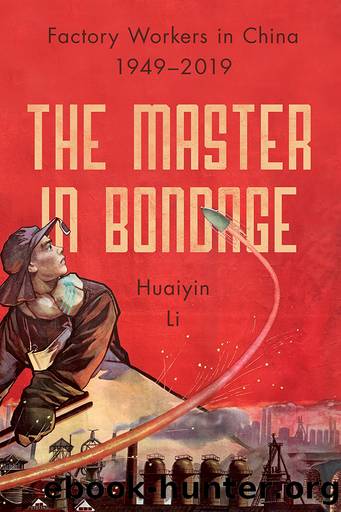The Master in Bondage by Huaiyin Li

Author:Huaiyin Li
Language: eng
Format: epub, pdf
Publisher: Stanford University Press
Published: 2023-06-15T00:00:00+00:00
The feeling of gratitude was also strong among workers recruited from the rural area. Given the barrier of the household registration system preventing the free flow of rural populations into the cities, the sharp contrast between the registered urban residents and their rural counterparts in their entitlement to the benefits offered by their respective production units, and the extremely rare opportunities for villagers to become state-enterprise employees, those who âjumped out of the farmersâ gateâ (tiao chu nongmen) felt themselves to be truly lucky, compared to the large number of young villagers left behind them. They felt that working hard was the only means to preserve their status as state employees and seek further opportunities for upward mobility. At the aforementioned dockyard in Guangzhou, many of the workers making concrete preforms were recruited from the countryside and thus felt âsatisfiedâ about their living condition. For them, âhaving moved from the countryside to the city, entered a large state enterprise, and become workers and urban residents, all these meant that their livelihood would be guaranteed by the state, and that they would have higher political standing. So they had a sense of honor. Most of them thus were highly motivatedâthis was very different from the materialism nowadays.â The informant himself, receiving thirty-one catties of rice a month like others, felt so grateful that he sincerely noted in his diary: âThanks to the Party Central, and thanks to Chairman Maoâ (N7). Likewise, the three female interviewees who had been villagers and later recruited by the Filature of Huanggang Region in Hubei province in 1966, 1960, and 1971, respectively, all said that they felt âvery proud,â âvery glorious,â and âvery happyâ for having moved âfrom the countryside to the cityâ and changed their status âfrom a peasant to a workerâ after three months of apprenticeship (H1, H3, H4). As a worker at Shijiazhuang Chemical Fertilizer Plant, Mr. Cui (b. 1936) felt âparticularly proudâ of his change from a villager to a worker of a state firm in 1957, which, as he put it, âappeared to be even more spectacular than having a child going to college nowadays from the villagersâ point of viewâ (B2). The same was true about the miners at the Shitouzui Mine of the Mining Industry Bureau of Wuhan Municipality, who were mostly recruited from the rural area. According to one of the miners, to âjump out of the farmersâ gateâ and become a miner, hence a state-firm employee, âwas very difficultâ because the recruitment involved strict investigation of candidatesâ political background. Once hired, all the young miners were highly enthusiastic, and everyone âwanted to perform wellâ (H13).
Entering a state enterprise also meant a lot to urban residents. In the 1960s and 1970s, as the urban population grew quickly, employment in state firms became increasingly competitive. Alternatively, more and more job candidates accepted positions in collective firms funded and run by local government authorities. The collective-enterprise employees accounted for 26.5 percent of the entire working force in 1957, 30 to
Download
This site does not store any files on its server. We only index and link to content provided by other sites. Please contact the content providers to delete copyright contents if any and email us, we'll remove relevant links or contents immediately.
Nudge - Improving Decisions about Health, Wealth, and Happiness by Thaler Sunstein(7706)
The Fire Next Time by James Baldwin(5442)
iGen by Jean M. Twenge(5415)
Adulting by Kelly Williams Brown(4574)
The Sports Rules Book by Human Kinetics(4386)
The Hacking of the American Mind by Robert H. Lustig(4381)
The Ethical Slut by Janet W. Hardy(4251)
Captivate by Vanessa Van Edwards(3839)
Mummy Knew by Lisa James(3691)
In a Sunburned Country by Bill Bryson(3542)
The Worm at the Core by Sheldon Solomon(3487)
Ants Among Elephants by Sujatha Gidla(3467)
The 48 laws of power by Robert Greene & Joost Elffers(3291)
Suicide: A Study in Sociology by Emile Durkheim(3022)
The Slow Fix: Solve Problems, Work Smarter, and Live Better In a World Addicted to Speed by Carl Honore(3009)
The Tipping Point by Malcolm Gladwell(2921)
Humans of New York by Brandon Stanton(2873)
Get What's Yours for Medicare: Maximize Your Coverage, Minimize Your Costs by Philip Moeller(2728)
Handbook of Forensic Sociology and Psychology by Stephen J. Morewitz & Mark L. Goldstein(2704)
